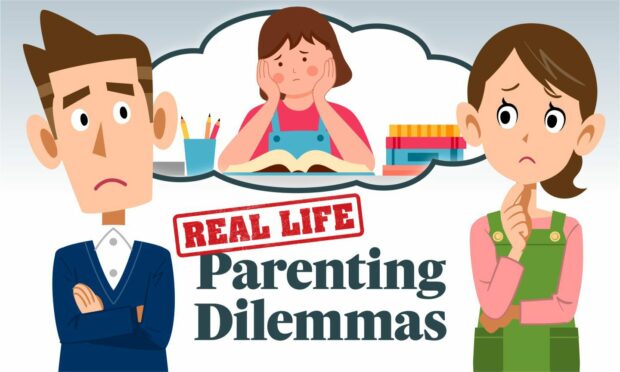The teenage years have their challenges, and it doesn’t get much more stressful than exams.
Between April and June last year Childline delivered 1,812 counselling sessions. That was more than double the previous year in 2021, when exams were cancelled due to Covid.
So there’s no doubt the return of in-person exams has increased teen stress levels, and right now, students are in the thick of it.
Exam stress brings yearly spike in teenagers seeking help
Alex McGillivray is a Childline supervisor based in the NSPCC’s Aberdeen office. He spoke to the P&J about exam stress, and how parents can help their children through arguably the most challenging period of adolescence.
“Every year we see a spike in May with exam stress,” said Alex.
“It has a massive impact on their mental health and their emotional health. A lot of them come through to us feeling anxious, depressed, hopeless, because they’re putting a lot of pressure on themselves.
“They think exams are the be all and end all: ‘If I don’t pass this my life’s over’.
“It’s a massive amount of pressure in a short amount of time. But in reality, it might not be quite as important as they think.”
‘If I don’t go to university I’ve failed’
Part of the problem is that since former Prime Minister Tony Blair’s famous pledge to get 50% of school leavers into higher education, many think that if they don’t go to university then they’ve somehow failed.
“A lot of young people that come through to us do think that,” said Alex.
“They’re probably thinking their whole future depends on the next couple of weeks.
“We assure them that that’s not the case. There are lots of other options available to them, whether it be college, training, apprenticeships and so on.”
He added: “A certain level of nervousness during exam time is normal. I mean it is a big thing, it’s a big time of life.
“When it’s getting too much is when it’s affecting other areas of their life. They might not be able to focus on anything else and not enjoy things they usually would. They might become more reclusive as well.”
Parents’ role in helping with exam stress
Research shows that a quarter of Scottish parents say academic pressure is causing their children to feel stressed.
So what can parents do?
“I think a lot of parents find it hard to know what to do, how to approach it, and they may be worried about making it worse,” said Alex.
“I’d advise them to be patient and supportive, and not pressure their children to talk when perhaps they’re not ready to.
“Encourage them to think about what they want to do next, but with the message that there’s no rush to make a decision right away.
“In reality, at 15, 16, 17 you don’t know exactly what you want to do, and it’s okay not to know. It’s important for parents to acknowledge that. Perhaps sit down with them and make a list of pros and cons of the sort of options that might interest them.”
Loose lips sink ships… and dent kids’ confidence
One thing parents should never do is underestimate the effect their words can have at home. Even a seemingly innocuous comment can have consequences years down the line.
“Some young people tell us that something a parent said years ago stuck with them.
“It could just be a comment, something like ‘you’re never going to achieve anything’. And that sticks, it’s like a mental loop.
“But positive statements can do the same thing: ‘you’re important, you can do this, you’re trying your best’.
“And then that will go through their head on exam day, rather than ‘I can’t do this, I’m not good enough’.”
Be patient and give them space
Alex went on: “Patience is the main thing for families.
“Teenagers find it difficult to talk anyway, and with the additional stress of exam time, it can be even more difficult for them to open up.
“So it’s about doing it at their pace and on their terms, rather than going: ‘you must tell me right now how you’re getting on’.
“Because some parents are so keen to see their kids do well, they might find it difficult to take that step back and give them that bit of space that they might need.
“For young people out there who are worried about speaking to their family about exams, we would just encourage them to remember that their family are there to support them.”
For those sitting exams this month who feel they have nowhere to turn, Childline is available 24 hours a day on 0800 1111.




Conversation